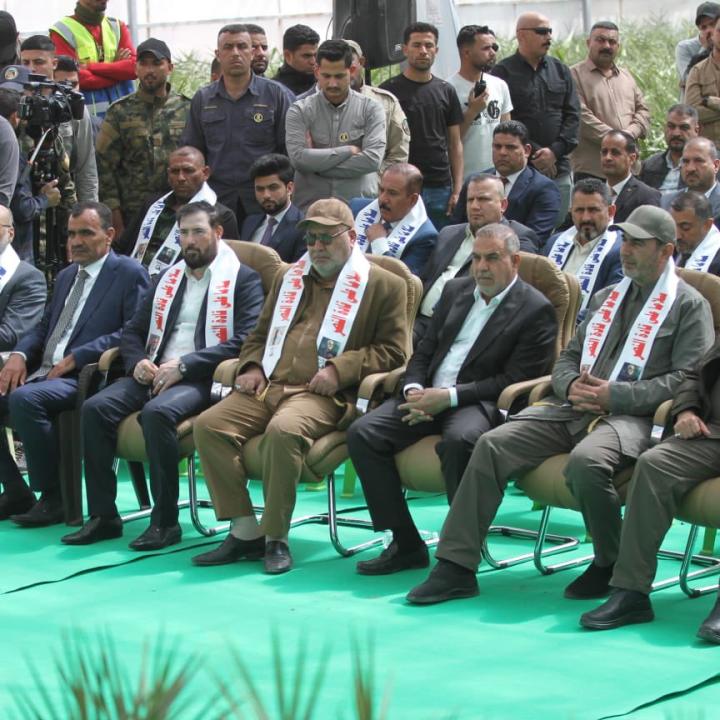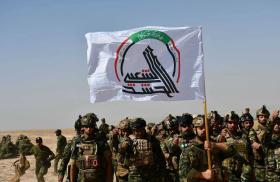
The Muhandis Company: Iraq’s Khatam al-Anbia

Similar to Iran's Revolutionary Guards, Iraqi "resistance" groups have long sought a company with preferential access to lucrative state contracts, and the Sudani government is finally providing them after years of opposition—on the Saudi border no less.
On March 21, Iraq's Muhandis General Company (Sharakat al-Muhandis al-Amma) launched its inaugural project—a commitment to plant one million trees in a large parcel of government-provided land in al-Muthanna province. The project had previously been granted to the Popular Mobilization Forces (PMF) during a cabinet meeting last November. The launch event was attended by both PMF chairman Faleh al-Fayyad, a U.S.-designated human rights abuser, and PMF chief of staff Abdul-Aziz al-Mohammadawi (aka Abu Fadak), a U.S.-designated terrorist (Figure 1).
The tree-planting project will be led by an engineer named Salah Mahdi, who claimed at the launch event that the company plans to work on two million Iraqi donums of land, equivalent to 1.2 million acres or 1,930 square miles (Figure 2). This parcel was granted in two tranches, the first in December 6, 2022, when Minister of Agriculture Abbas al-Alyawi told al-Ahd TV, an outlet run by the Iran-backed muqawama (resistance) group Asaib Ahl al-Haq, that the PMF had been granted 1 million Iraqi donums in al-Muthanna. This transfer of lands that were already essentially controlled by the PMF must have occurred right after Prime Minister Mohammed Shia al-Sudani's cabinet authorized the company with primary capital of 100 billion Iraqi dinar ($67 million), 90 percent of which would be transferred government assets and 10 percent in cash. Now the company has received a second tranche of 1 million donums. It is unclear how the land was legally transferred, unless the company's articles of incorporation include an unprecedented waiver from the normal cabinet exemptions needed to receive free land.
The formation of a PMF-owned state construction firm has long been sought by Fayyad and other Iran-backed militia leaders. Their aim is to give the PMF the equivalent of Khatam al-Anbia, the Iranian company owned by the Islamic Revolutionary Guard Corps (IRGC), another U.S.-designated terrorist organization. Also known as Ghorb, Khatam al-Anbia was formed by the IRGC in 1990 so that Revolutionary Guard personnel could reap the rewards of more than 1,200 construction contracts with an estimated value of over $50 billion, mostly in the form of no-bid awards. The company has since been sanctioned by the UN, the European Union, and the United States.
The PMF's first effort to establish an Iraqi version of this company occurred when Iran-backed militias last controlled the government. From Prime Minister Adil Abdulmahdi's appointment in October 2018 until February 2019, Fayyad and the late militia chief Abu Mahdi al-Muhandis lobbied the government regarding the state-owned road-building and construction firm Mutasim, asking that its land, equipment, and contracts be transferred from the Ministry of Construction and Housing to the PMF. This effort failed when the U.S. government saw through the blatant effort to mimic the IRGC formula and protested with Baghdad until it was abandoned.
A second effort was made in February 2021 when Fayyad and Abu Fadak tried to intimidate Prime Minister Mustafa al-Kadhimi and the head of the National Investment Commission into authorizing a PMF-owned construction arm, now referred to as the Muhandis General Company. The name is a play on words as "Muhandis" means "engineer" in Arabic but also calls to mind Abu Mahdi al-Muhandis, who was killed in a U.S. airstrike a year earlier alongside IRGC-Qods Force commander Qasem Soleimani. In exchange for forming the company, Kadhimi was offered a second term as premier, but he refused.
Around the same time, Abu Fadak made an unsuccessful effort to secure a pair of million-donum land parcels in al-Muthanna via an investment license and a cabinet decree—exactly what was later gifted to the Muhandis Company. The PMF then seized de facto control of the area and began work without any authorization by June 2022, eventually convincing officials from the Ministry of Water Resources to visit the project on November 20. The Muhandis Company was formed just a few days later, on November 28, during the sixth weekly cabinet meeting of Sudani's government (Figure 3).
Land grants have now begun to flow to the company without a clear legal mechanism. As the parcels far outstrip the requirements of real projects—for example, Iraq’s largest dairy farm involves no more than 36,000 donums, not 2 million—muqawama leaders seem to have identified tree planting as a supposed justification for transferring a staggering 9 percent of al-Muthanna province's entire land mass. Yet the area chosen does not make much sense for such a project: it lacks sufficient water for the mass growing of palm and jojoba trees, and far more viable options exist between the Tigris and Euphrates Rivers. Tellingly, however, the area in question is strategically located on the border with Saudi Arabia. In 2021-22, Iraqi militias launched drones into Saudi territory and the United Arab Emirates from this area.
Accordingly, the U.S. government needs to watch the Muhandis General Company with extraordinary care—and ideally sanction it due to its direct ties with U.S.-designated persons involved in serious human rights abuses and terrorism. There are also indications that the PMF will use the company to receive further multi-million-donum land grants on the Jordanian border, in al-Muthanna, and in Diyala province. These grants and other transfers could be arranged through the Ministry of Construction and Housing, the Ministry of Agriculture, the National Investment Commission, the Ministry of Industry and Minerals, the Ministry of Defense, the Ministry of Oil, or the default landowner in Iraq, the Ministry of Finance.







